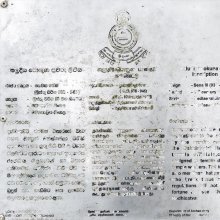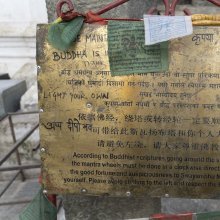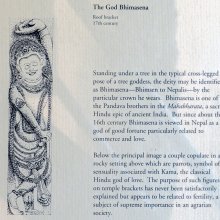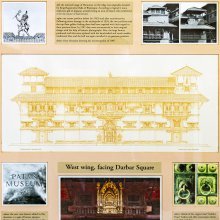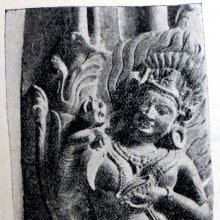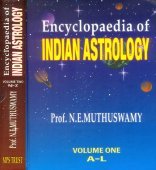Fortune: 1 definition
Introduction:
Fortune means something in Hinduism, Sanskrit. If you want to know the exact meaning, history, etymology or English translation of this term then check out the descriptions on this page. Add your comment or reference to a book if you want to contribute to this summary article.
Images (photo gallery)
(+1 more images available)
In Hinduism
Jyotisha (astronomy and astrology)
Source: Journal of South Asian Intellectual History: Samarasiṃha and the Early Transmission of Tājika AstrologyFortune refers to one the “thirty-two astrological lots” (sahamas), as discussed in the fourth chapter of the Karmaprakāśa—one of the earliest preserved Sanskrit works on Perso-Arabic (Tājika) astrology authored by Samarasiṃha in the 13th century.—The so-called lots (Sanskrit: sahamas; Arabic: sahm, translating κλῆρος) are derived by measuring the longitudinal distance between two predefined points in a horoscope (typically two planets) and projecting it from a third point (typically the ascendant degree). Of these 32 lots [e.g., Fortune], all but two are present in what has become the most widespread list of Tājika sahamas, compiled some three centuries later by Nīlakaṇṭha and comprising 50 items.

Jyotisha (ज्योतिष, jyotiṣa or jyotish) refers to ‘astronomy’ or “Vedic astrology” and represents the fifth of the six Vedangas (additional sciences to be studied along with the Vedas). Jyotisha concerns itself with the study and prediction of the movements of celestial bodies, in order to calculate the auspicious time for rituals and ceremonies.
See also (Relevant definitions)
Query error!
Full-text (+1494): Lakshmi, Bhagya, Saubhagya, Ikshanika, Bhaga, Ranalakshmi, Bhagyodaya, Abhyudaya, Rajalakshmi, Adrishta, Alakshmi, Daivadasha, Punyodaya, Kalyana, Subhaga, Shubha, Daivajna, Bhagadheya, Viprashnika, Samudrika.
Relevant text
Search found 372 books and stories containing Fortune, Fortunes, The fortune; (plurals include: Fortunes, Fortuneses, The fortunes). You can also click to the full overview containing English textual excerpts. Below are direct links for the most relevant articles:
Brihat Jataka by Varahamihira [Sanskrit/English] (by Michael D Neely)
Verse 18.3 < [Chapter 19 - Results of the Aspects]
Verse 8.15 < [Chapter 9 - Ashtakavarga]
Verse 21.4 < [Chapter 22 - Miscellaneous Yogas]
Manusmriti with the Commentary of Medhatithi (by Ganganatha Jha)
Verse 9.258 < [Section XXXVI - Who are ‘Thorns’ (kaṇṭaka)?]
Verse 7.11 < [Section I - Important Position of the King (rājan)]
Verse 8.61 < [Section XII (A) - Evidence]
Matsya Purana (critical study) (by Kushal Kalita)
Part 2.1n - The Pāñcāla Dynasty < [Chapter 3 - Historical aspects in the Matsyapurāṇa]
Part 4.3d - Viśokadvādaśī-vrata < [Chapter 4 - Religious aspects of the Matsyapurāṇa]
Part 4.2g - Ādityaśayana-vrata < [Chapter 4 - Religious aspects of the Matsyapurāṇa]
Mudrarakshasa (literary study) (by Antara Chakravarty)
6.2. Cāṇakya: As the Hero of the Drama < [Chapter 6 - Other Literary Estimates of Mudrārākṣasa]
3.17. Use of Vibhāvanā-alaṃkāra < [Chapter 3 - Use of Alaṃkāras in Mudrārākṣasa]
3.25. Use of Arthāntaranyāsa-alaṃkāra < [Chapter 3 - Use of Alaṃkāras in Mudrārākṣasa]
Trichinopoly - the Athens of South India < [November-December, 1929]
K. Balasubramania Iyer: Last of the < [July – Sept. & Oct. – Dec. 1992]
An Artistic Soul < [July 1970]
Brihad Bhagavatamrita (commentary) (by Śrī Śrīmad Bhaktivedānta Nārāyana Gosvāmī Mahārāja)
Verse 2.1.205 < [Chapter 1 - Vairāgya (renunciation)]
Verse 1.3.79 < [Chapter 3 - Prapañcātīta (beyond the Material Plane)]
Verse 1.5.7 < [Chapter 5 - Priya (the beloved devotees)]
Related products

